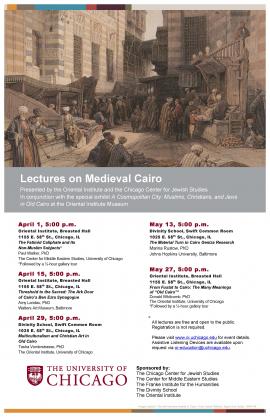The Fatimid Caliphate and Its Non-Muslim Subjects
Paul Walker, Ph.D.
Center for Middle Eastern Studies, University of Chicago
Wednesdasy, April 1, 2015
5:00pm
Breasted Hall, Oriental Institute
1155 Eas 58th Street, Chicago, IL
Abstract: As imams of the Ismaili Shi’a, the Fatimid caliphs were forced to contend with a Sunni majority that was often quite hostile in nearly all regions of their vast empire. In addition, once they conquered Egypt and began to rule from their newly created imperial capital of Cairo in 969, they inherited a substantial subject population of non-Muslims: Christians and Jews belonging to various denominations. How they dealt with problems arising from having to govern these different communities suggests, in general, a policy of tolerance and inclusion, with Christian and Jewish participation at the highest levels of government and of the social order. One of the viziers was in fact an unconverted Christian. Although a notable period of persecution and repression occurred during the reign of al-Hakim (996-1021), the non-Muslim subjects of the Fatimids most often fared well up to the close of their era in 1171.
This lecture will be followed by a 1/2-hour gallery tour by exhibit co-curator Tasha Vorderstrasse. This lecture is part of a series of lectures on medieval Cairo presented by the Oriental Institute and the Chicago Center for Jewish Studies in conjunction with the special exhibit A Cosmopolitan City: Muslims, Christians, and Jews in Old Cairo at the Oriental Institute Museum.
The link to the information about this lecture can be found at: https://oi.uchicago.edu/exhibits-events
For more details visit our Event Calendar
About this Lecture Series: The Oriental Institute and the Chicago Center for Jewish Studies at the University of Chicago are pleased to announce a series of lectures held in conjunction with the special exhibit A Cosmopolitan City: Muslims, Christians, and Jews in Old Cairo at the Oriental Institute Museum. This lecture series brings together specialists in the history, art, and archaeology of Old Cairo (Fustat) for a unique exploration this cosmopolitan city and its place within the wider Mediterranean and Islamic world. The program is generously supported by the Oriental Institute, the Center for Jewish Studies, the Franke Institute for the Humanities, the Center for Middle Eastern Studies, and the Divinity School of the University of Chicago.


